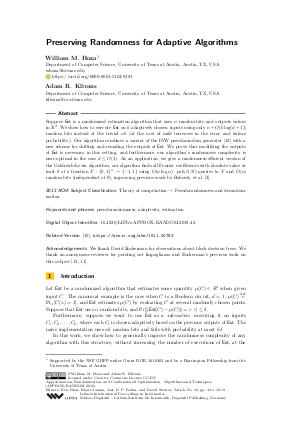Preserving Randomness for Adaptive Algorithms
Authors
William M. Hoza  ,
Adam R. Klivans
,
Adam R. Klivans
-
Part of:
Volume:
Approximation, Randomization, and Combinatorial Optimization. Algorithms and Techniques (APPROX/RANDOM 2018)
Part of: Series: Leibniz International Proceedings in Informatics (LIPIcs)
Part of: Conference: International Conference on Randomization and Computation (RANDOM)
Part of: Conference: International Conference on Approximation Algorithms for Combinatorial Optimization Problems (APPROX) - License:
 Creative Commons Attribution 3.0 Unported license
Creative Commons Attribution 3.0 Unported license
- Publication Date: 2018-08-13
File

PDF
LIPIcs.APPROX-RANDOM.2018.43.pdf
- Filesize: 0.59 MB
- 19 pages
Document Identifiers
Related Versions
Subject Classification
ACM Subject Classification
- Theory of computation → Pseudorandomness and derandomization
Keywords
- pseudorandomness
- adaptivity
- estimation
Metrics
- Access Statistics
-
Total Accesses (updated on a weekly basis)
0Document
0Metadata
Abstract
Suppose Est is a randomized estimation algorithm that uses n random bits and outputs values in R^d. We show how to execute Est on k adaptively chosen inputs using only n + O(k log(d + 1)) random bits instead of the trivial nk (at the cost of mild increases in the error and failure probability). Our algorithm combines a variant of the INW pseudorandom generator [Impagliazzo et al., 1994] with a new scheme for shifting and rounding the outputs of Est. We prove that modifying the outputs of Est is necessary in this setting, and furthermore, our algorithm's randomness complexity is near-optimal in the case d <= O(1). As an application, we give a randomness-efficient version of the Goldreich-Levin algorithm; our algorithm finds all Fourier coefficients with absolute value at least theta of a function F: {0, 1}^n -> {-1, 1} using O(n log n) * poly(1/theta) queries to F and O(n) random bits (independent of theta), improving previous work by Bshouty et al. [Bshouty et al., 2004].
Cite As Get BibTex
William M. Hoza and Adam R. Klivans. Preserving Randomness for Adaptive Algorithms. In Approximation, Randomization, and Combinatorial Optimization. Algorithms and Techniques (APPROX/RANDOM 2018). Leibniz International Proceedings in Informatics (LIPIcs), Volume 116, pp. 43:1-43:19, Schloss Dagstuhl – Leibniz-Zentrum für Informatik (2018)
https://doi.org/10.4230/LIPIcs.APPROX-RANDOM.2018.43
BibTex
@InProceedings{hoza_et_al:LIPIcs.APPROX-RANDOM.2018.43,
author = {Hoza, William M. and Klivans, Adam R.},
title = {{Preserving Randomness for Adaptive Algorithms}},
booktitle = {Approximation, Randomization, and Combinatorial Optimization. Algorithms and Techniques (APPROX/RANDOM 2018)},
pages = {43:1--43:19},
series = {Leibniz International Proceedings in Informatics (LIPIcs)},
ISBN = {978-3-95977-085-9},
ISSN = {1868-8969},
year = {2018},
volume = {116},
editor = {Blais, Eric and Jansen, Klaus and D. P. Rolim, Jos\'{e} and Steurer, David},
publisher = {Schloss Dagstuhl -- Leibniz-Zentrum f{\"u}r Informatik},
address = {Dagstuhl, Germany},
URL = {https://drops.dagstuhl.de/entities/document/10.4230/LIPIcs.APPROX-RANDOM.2018.43},
URN = {urn:nbn:de:0030-drops-94477},
doi = {10.4230/LIPIcs.APPROX-RANDOM.2018.43},
annote = {Keywords: pseudorandomness, adaptivity, estimation}
}
Author Details
Funding
- Hoza, William M.: Supported by the NSF GRFP under Grant DGE-1610403 and by a Harrington Fellowship from the University of Texas at Austin.
References
-
R. Armoni. On the derandomization of space-bounded computations. In Randomization and Approximation Techniques in Computer Science, pages 47-59. Springer, 1998.

-
M. Bellare. A technique for upper bounding the spectral norm with applications to learning. In Proceedings of the 5th Annual Workshop on Computational Learning Theory, pages 62-70. ACM, 1992.

-
N. H. Bshouty, J. C. Jackson, and C. Tamon. More efficient PAC-learning of DNF with membership queries under the uniform distribution. Journal of Computer and System Sciences, 68(1):205-234, 2004.

-
H. Buhrman and L. Fortnow. One-sided versus two-sided error in probabilistic computation. In Annual Symposium on Theoretical Aspects of Computer Science, pages 100-109. Springer, 1999.

-
Y. Dodis, R. Ostrovsky, L. Reyzin, and A. Smith. Fuzzy extractors: How to generate strong keys from biometrics and other noisy data. SIAM journal on computing, 38(1):97-139, 2008.

-
C. Dwork, V. Feldman, M. Hardt, T. Pitassi, O. Reingold, and A. L. Roth. Preserving statistical validity in adaptive data analysis. In Proceedings of the 47th Annual Symposium on Theory of Computing, STOC '15, pages 117-126. ACM, 2015.

-
E. Gat and S. Goldwasser. Probabilistic search algorithms with unique answers and their cryptographic applications. In Electronic Colloquium on Computational Complexity (ECCC), volume 18, page 136, 2011.

-
O. Goldreich and L. A. Levin. A hard-core predicate for all one-way functions. In Proceedings of the 21st Annual ACM Symposium on Theory of Computing, STOC '89, pages 25-32. ACM, 1989.

- O. Goldreich and A. Wigderson. Tiny families of functions with random properties: A quality-size trade-off for hashing. Random Structures &Algorithms, 11(4):315-343, 1997. URL: http://dx.doi.org/10.1002/(SICI)1098-2418(199712)11:4<315::AID-RSA3>3.0.CO;2-1.
-
W. M. Hoza and A. R. Klivans. Preserving randomness for adaptive algorithms. arXiv preprint arXiv:1611.00783, 2016.

- R. Impagliazzo. Pseudo-random generators for cryptography and for randomized algorithms. PhD thesis, University of California, Berkeley, 1992. URL: http://cseweb.ucsd.edu/users/russell/format.ps.
-
R. Impagliazzo, N. Nisan, and A. Wigderson. Pseudorandomness for network algorithms. In Proceedings of the 26th Annual Symposium on Theory of Computing, STOC '94, pages 356-364. ACM, 1994.

-
R. Impagliazzo and D. Zuckerman. How to recycle random bits. In Proceedings of the 30th Annual Symposium on Foundations of Computer Science, FOCS '89, pages 248-253. IEEE, 1989.

-
E. Kushilevitz and Y. Mansour. Learning decision trees using the Fourier spectrum. SIAM Journal on Computing, 22(6):1331-1348, 1993.

-
L. A. Levin. Randomness and nondeterminism. Journal of Symbolic Logic, 58(3):1102-1103, 1993.

-
P. Moser. Relative to p promise-bpp equals app. In Electronic Colloquium on Computational Complexity (ECCC) Report TR01, volume 68, 2001.

-
J. Naor and M. Naor. Small-bias probability spaces: Efficient constructions and applications. SIAM journal on computing, 22(4):838-856, 1993.

-
N. Nisan and D. Zuckerman. Randomness is linear in space. Journal of Computer and System Sciences, 52(1):43-52, 1996.

-
R. O'Donnell. Analysis of boolean functions. Cambridge University Press, 2014.

- R. Raz and O. Reingold. On recycling the randomness of states in space bounded computation. In Proceedings of the 31st Annual ACM Symposium on Theory of Computing, STOC '99, pages 159-168. ACM, 1999. URL: http://dx.doi.org/10.1145/301250.301294.
-
M. Saks and S. Zhou. BP_H SPACE(S) ⊆ DSPACE(S^3/2). Journal of Computer and System Sciences, 58(2):376-403, 1999.

-
S. P. Vadhan. Pseudorandomness, volume 56. Now, 2012.

